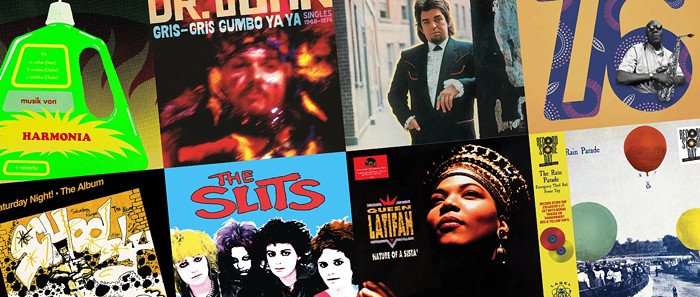
Following up yesterday’s Song of the Day post on 6ix’s “I’m Just Like You,” today we have an interview with Alec Palao, the man who wrote liner notes for Light in the Attic’s compilation I’m Just Like You: Sly’s Stone Flower 1969-1970 (available now on CD and MP3; out Nov. 4 on 2XLP), which includes that cut and 17 others from the short-lived imprint. Palao serves as the West Coast music consultant for the British label Ace and is also a journalist and musician who’s played for the Sneetches, the Magic Christian, and many other bands.
For Ace Records, Palao compiled and wrote liner notes for 2009's Listen to the Voices: Sly Stone in the Studio 1965-1970. The LITA comp differs from the previous one with 10 previously unreleased archival tracks by Sly Stone during that fertile period between 1969’s Stand! and 1971’s There’s a Riot Goin’ On. Sly wrote, produced, and arranged everything on Stone Flower, and it proved to be a pivotal phase where he scaled back the orchestral turbulence of previous Family Stone records and crafted more interior but just as intense and even more funky and seductive songs, with help from the Maestro Rhythm King drum machine. Below is a Q&A conducted with Palao via email.
You scored a rare interview with Sly Stone for I’m Just Like You. Did you have any revelations or hear any unusual/fascinating anecdotes when speaking to Sly? How is he doing these days? Does his mind seem sharp?
Actually the interview done for this current project is my second time talking on record with Sly. In 2009 I spent several days with him, and got a lot of information, specifically for [Listen to the Voices]. For I’m Just Like You, we conducted an additional interview early this year where I asked him more specifics on the Stone Flower era. But in both cases my focus was, unlike 90 percent of the prurient articles about him of recent times, squarely upon his music and its inspiration and creation.
Despite having lived in a kind of alternate universe since the late 1970s, Sly Stone is as funny, personable and sharp as he always has been. He could easily host his own talk show and is always quick with an aphorism or a studied observation. Despite being a recluse, he is still very aware of what is going on in the world (and doesn’t seem to be too impressed with the current state of black music). He also remains very active making music and continually creative. In 2009, in-between our chats, I ran some errands for him, which included buying him a tracksuit—yes, I styled Sly Stone—and this year I took a ride with him to the pawn shop to get his computer out of hock, and that was an eye-opener. Sly, whose love of motor vehicles is well-known, is somewhat of a leadfoot!
Would it be accurate to say Sly was using these Stone Flower sides to transition into a new phase for the Family Stone?
Absolutely. I feel while Sly had not exhausted any of his musical or creative ideas, he was moving away from big arrangements and more complicated productions. It might have had something to do with the fact his “simpler” music—i.e., the big hits like "Everyday People"—were those that made their mark. Also, he was becoming more insular and that was reflected in the reputation for no-shows or tardiness at gigs. He preferred—and he still prefers—to be left alone to make his music. Moving to LA, where he could truly sequester in the studio, and the discovery of the Rhythm King drum machine, were major factors. The gritty sound of the Stone Flower sides and subsequently Riot were almost an inverse reaction to the well-produced Family Stone recordings.
What’s the story with the previously unreleased Sly tracks?
They are amongst a cache of Stone Flower recordings that have long been discussed amongst fans, as the titles were first mentioned in Michel Ruppli’s famous Atlantic Records discographies. The tracks were delivered to Atlantic, who were distributing Stone Flower at the time, possibly as a contractual necessity, but in many cases they are just experimental recordings, or demos; not releasable at that time, but of course in hindsight useful to help join the dots in Sly’s musical metamorphosis. What I included in the CD are those I felt the most illuminating, particularly the demo of "Just Like A Baby" with Freddie Stone singing. Most of what remains in the vault are simply drum machine tracks with an occasional bass or keyboard lick.
The quality of Stone Flower’s releases is unbelievably high. Why do you think the singles have remained so obscure over the years, except to obsessive collectors? I don’t recall ever hearing these songs on the radio while growing up in the Detroit area (I was 8 in 1970 and listening to a lot of radio then), not even Little Sister’s “You’re the One.” Were they mainly popular in the California/Bay Area?
The Bay Area was always a stronghold for Sly & The Family Stone, that is true. But the singles got airplay around the country, mostly pop, because R&B radio was still pretty resistant to change—and the drum machine would have definitely been an oddity at the time. Don’t forget that after "You’re The One" was successful, there was a lengthy gap of almost a year before the other three Stone Flower label singles were released. Sly’s musical shift occurred mainly during that time and I think the fact that he owed a new album to Epic meant that he had to sideline any further production work.
Why did Stone Flower end after only four releases?
Stone Flower the label ended for various reasons—the aforementioned delay of what would become Riot, the fragmentation of the original Family Stone band, and perhaps most importantly, the disengagement of Sly’s partner in the label and production company, David Kapralik, who resigned as the Family Stone’s manager in 1971.



















